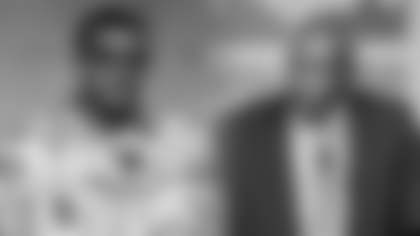From May 2 to May 2, Woody Paige was there when John Elway's Broncos career began in Denver and when it ended.
Exactly sixteen years elapsed in between that day in 1983, when Elway was traded to Denver, and that same day in 1999, when he announced his retirement. There's not much Paige has forgotten about that span — except the name of the golf course where Elway told Paige that he'd be retiring from the NFL, just days before he was scheduled to make it official.
That was at Cypress Point.
Elway, there for a round of golf a few months after winning a second Super Bowl in back-to-back seasons, limped heavily as he left the 18th green, Paige recalls.
Then, in the moments that followed, Elway admitted that he'd soon announce the end to his career in a press conference in Denver, bringing a close to a 16-year run with the Broncos that reshaped the franchise and, in Paige's perspective, the city itself.
"His presence from May 2 to May 2 really was responsible for Denver not being … just another town," Paige says.
May 2, 1983
The Broncos had needed a quarterback before.
At best, that usually resulted in an aging quarterback overperforming, like Craig Morton arriving in Denver after already playing 12 NFL seasons or Frank Tripucka restarting his pro career in America a decade after it first began.
At worst, it produced a parade of forgettable passers.
In 1982, the Broncos were stuck between those two archetypes. Morton, then in his 18th and final season, began the year as the starting quarterback but struggled in the first two games, throwing three interceptions and no touchdowns. His backup, Steve DeBerg was somewhat more successful, but he still had 11 interceptions and just seven touchdowns on the year.
The Broncos ended the season with just two wins in nine games.
But it was the middle of the season, when the NFL players went onstrike, that produced the most interesting development for Paige.
During this time, Paige, then at The Denver Post, was instructed to pick out the best college football game each week to cover while the NFL was at a two-month-long standstill. He went to see football legends like Herschel Walker, Dan Marino and Eric Dickerson — and then, on Oct. 30, 1982, he saw Elway.
In a massive upset, Elway led Stanford to a 43-31 win over the second-ranked Washington Huskies. He completed 20 of his 30 passes for 265 yards and two touchdowns, and of his final 17 passes, he completed all but one.
A riveted Paige returned to Denver and met with then-Broncos head coach Dan Reeves in his office.
"Dan, I just saw the future of the NFL," Paige recalls telling Reeves.
Reeves replied, "You may be right, but there's no way we'll ever have him on our team."
At the time, Paige agreed with that assessment, even if this was a chance for the team to get out of its usual quarterback routine. For one thing, they didn't have the top pick in the draft, and Elway was easily the top player. Aside from that, top quarterbacks required top investments, and then-owner Edgar Kaiser Jr. did not strike him as capable of competing with other owners who were more flush with cash to acquire the pick or go after Elway.
What Kaiser did have on his side, though, was a kind of kinship with Baltimore Colts owner Bob Irsay, which proved fruitful after the Colts drafted Elway.
"His father, Jack Elway, knew the coach of the Colts," Paige recalls. "He had coached with him and been around him and he told John, 'There's no way you can play for him.' … Frank Kush, at Arizona State, had Mount Kush and he'd make the players in 100-degree heat go up and down that mountain. And they hated him. He was a guy who grabbed guys' facemasks and everything else. So Jack told John, 'You're not going to play for him. I will do whatever's necessary to keep you from playing for Kush.'"
Kaiser, after speaking with Irsay, consulted Reeves about trying to trade for Elway, and they then began to formulate a deal.
When it all came together on May 2, Paige and much of Denver's sports media members were at McNichols Sports Arena for a Denver Nuggets playoff game against the San Antonio Spurs.
But by the time the buzzer sounded and the Nuggets celebrated their sole win of the series, Paige and several of his cohorts were long gone.
Earlier that day, he had gotten word that the trade was happening from a source at the league level, which he then confirmed with a sourceat the Broncos. Director of Public Relations Jim Saccomano later notified the media of a press conference at 9 p.m., and so Paige departed McNichols Arena.
The Nuggets may have won, but the Broncos had gotten the best quarterback prospect perhaps in the history of the NFL.
"Nobody remembers that [Nuggets] game," Paige says.
May 2, 1999
Like Elway's trade to Denver, his retirement was simply the culmination of events that had already occurred.
He had won a Super Bowl. Then he had won a second Super Bowl.
After 14 long years of doubt and pain, Elway had answered the only question still lingering over his head when he hoisted one Lombardi Trophy and then a second.
But that satisfaction, Paige says, wasn't why he hung up his cleats. It was the limp that he had as he finished his round of golf at one of America's finest golf courses.
Paige had watched him finish his round from a small hill overlooking the final hole. Covering the Colorado Avalanche's playoff series against the San Jose Sharks had put him just about an hour away from the course, and he had heard Elway was participating in a private tournament there.
When Elway wrapped up the final hole, he took a seat on the hill, too.
"He told me when we were sitting on that hillside that he was going to have to have surgery again on his knee," Paige says. "I said, 'Well, I can see you're limping.' … He said, 'If I were to come back, I'd have to go through rehabilitation again. … I remember distinctly him saying, 'I just don't want to go through rehabilitation again.' He didn't say, 'I won two Super Bowls,' or anything else; it was just he was tired of going through rehabilitation."
Out of respect for the families affected by the Columbine school shooting that occurred days earlier, Elway postponed his press conference until May 2.
When he finally took the stage at the Inverness Hotel to announce his retirement, he struggled to hold back the emotion of the moment. All the love — for the game, for his teammates, for the city and the region — it was impossible to contain.
"What I remember about it, it was very emotional," Paige recalls. "From my standpoint, it was 16 years of John Elway and what he accomplished during all that time. He cried. I mean, they all cry, but he was bawling. It was goodbye. It was goodbye to an era."
Sixteen years is such a long time, and now it seemed so short — almost like it fit in one day.














